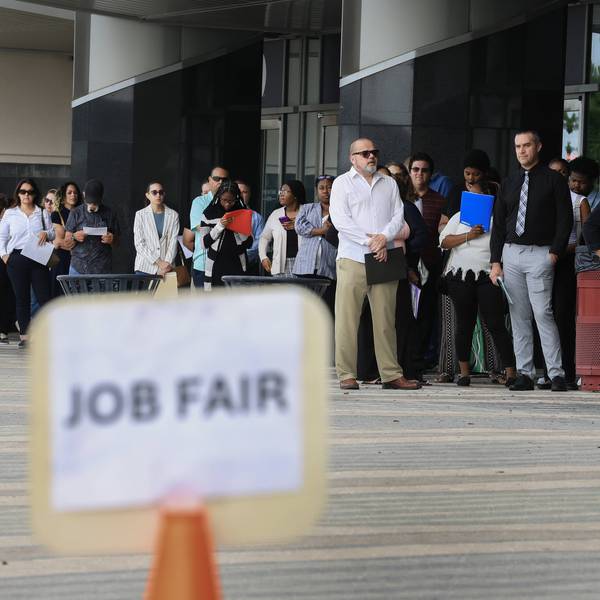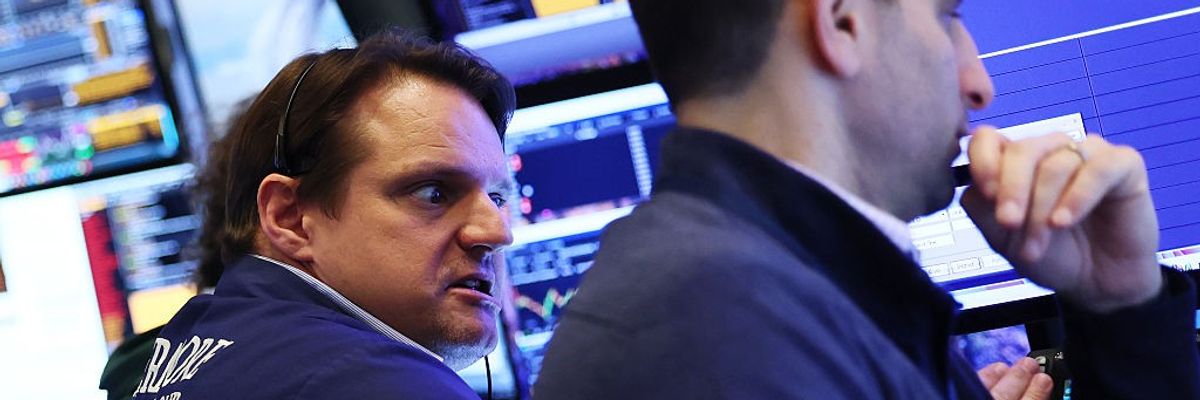A week after Goldman Sachs
raised the chance of a U.S. recession in the next 12 months from
20% to 35%, the Wall Street giant elevated it to 45% on Sunday, following President Donald Trump's worse-than-anticipated tariff announcement.
Goldman Sachs' note—tilted,
Countdown to Recession—points to "a sharp tightening in financial conditions, foreign consumer boycotts, and a continued spike in policy uncertainty that is likely to depress capital spending by more than we had previously assumed."
The analysis is based on expectations that negotiations early this week will lead to "a large reduction in the tariffs" that Trump is set to impose on Wednesday. If that doesn't happen, Goldman's forecast is expected to change for the worse.
Since Trump's "Liberation Day"
announcement last Wednesday, "at least seven top investment banks have raised their recession risk forecasts," Reuters noted Monday, "with JPMorgan putting the odds of a U.S. and global recession at 60%, on fears that the tariffs will not only ignite U.S. inflation but also spark retaliatory measures from other countries, as China has already announced."
China initially
responded to Trump on Friday with 34% import duties on all American goods. The U.S. president hit back on Monday, further escalating his trade war with the Chinese government by threatening to impose an additional 50% tariff. Citing a White House official, CNBC pointed out that "U.S. tariffs on China will total 104% if Trump's latest threat takes effect."
Trump in a Truth Social post: "Additionally, all talks with China concerning their requested meetings with us will be terminated! Negotiations with other countries, which have also requested meetings, will begin taking place immediately."
Stocks have
plummeted over the past week, and were "swinging Monday following a manic morning where indexes plunged, soared, and then sank again as Wall Street tossed around a false rumor," The Associated Press reported.
"A White House account on X said a rumor circulating that Trump was considering a 90-day pause on his tariffs was 'fake news,'" the
AP continued. "The intense and sudden moves show how hard financial markets are straining to see hopes that Trump may let up on his stiff tariffs, which economists see raising the risks of a global recession."
While progressive economists and working-class people have highlighted how Trump's "
batshit crazy" tariffs are expected to impact everyday Americans—as the cost of the duties are passed on to consumers—many executives are also blasting the president's policy.
One respondent to a
CNBC CEO Council survey called Trump's tariffs "disappointingly stupid and illogical," and said that "without faith that our government knows what it is doing, it is impossible for businesses to thrive."
According to
CNBC, other CEO responses included:
- "This is the Trump recession."
- "Trump has imposed tariffs on component parts that are simply unavailable in the U.S. and never will be. He has surrounded himself with an incompetent cadre of yes men and women unable or unwilling to offer him cogent counsel."
- "We imagine that our suppliers will have to swallow part of the tariff, and we will have to pass on part of the tariff to our customers. We are controlling what we can control, pricing and sourcing decisions. We can't control the impact of tariffs on the consumer mindset, which we imagine could be significant."
Democrats in Congress also continued to call out the Republican president on Monday.
"Trump and House Republicans are crashing the economy, raising your cost of living, and driving us toward a recession,"
said the chamber's minority leader, Rep. Hakeem Jeffries (D-N.Y.). "What happened to the so-called golden era of America?"




